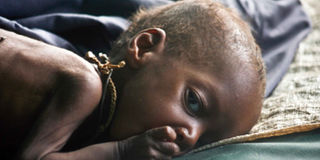Kenya told to open up new refugee camp

PHOTO/TOM MARUKO/NATION
A malnourished Somali child in hospital at the Dadaab refugee camp on July 11, 2011. Thousands of Somalis are fleeing the war and drought in their country.
A United Nations agency wants Kenya to open up a new settlement to accommodate refugees who have flocked the Daadab camp.
The head of the UN refugee agency Antonio Guterres was taken aback by the pathetic state of affairs at the camp, one of the word’s largest, when he visited at the weekend.
“I have visited refugee camps around the world, but I must admit I have never seen people living under such conditions,” he said.
According to UNHCR, the camp initially set up to cater for only 90,000 refugees, has now exceeded the number by nearly five time
‘Poorest of the poor’
Mr Guterres described the refugees flocking to Daadab as “the poorest of the poor and the most vulnerable of the vulnerable.”
The UN refugee agency is still pressing the Kenyan government to accept the completion of IFO II camp to admit another group of at least 35,000 people. The other camps are Dagahaley, Ifo and Hagadera.
The situation has been worsened by the current drought in the Horn of Africa region, which is estimated to have affected at least 10 million people across Kenya, Uganda, Ethiopia and Somalia.
International aid firm Oxfam expressed support for the UNHCR appeal, saying that opening up of Ifo II would enable relief agencies to reach the refugees.
“It is tragic that vulnerable families are trapped in limbo, forced to endure appalling conditions while there are fully functioning services right next door. Their basic needs are being ignored,” said Joost van de Lest, head of Oxfam in Kenya.
The number of refugees at the camp continues to increase every day even as it emerges that it is not just the war in Somalia that is pushing them into Kenya — many are escaping the hunger and famine back home.
They arrive in droves, with most of the women and children too weak to walk or even stand.
At the camp’s hospital are malnourished children with spindly limbs, wrinkled skin and pale eyes on beds beside their sad mothers.
Ms Isha Abdulrahman from Jubaland and a mother of twin boys is at the hospital. One of the boys is clinging to her breasts as she cuddles the other in her arms — the one who is recovering from near-starvation.
Ms Abdulrahman said she travelled from Saqu in the middle of Jubaland in Somalia where she had been a farmer. “A harsh drought wiped away all our crops,” she told the Nation through a translator.
She arrived here three weeks ago. By the time she arrived here, the weaker of her twins was almost succumbing to hunger.




